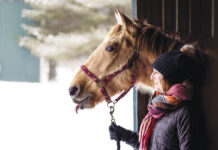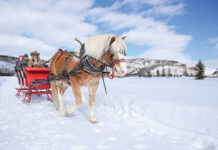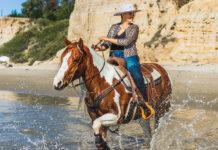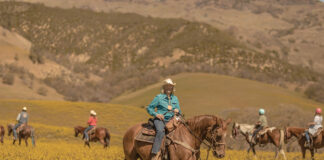Editor’s Note: Horse Illustrated is introducing a new column for 2015. Stable Advice is a place for our readers to offer their advice on some of those uniquely equestrian problems. These aren’t the questions that you’d normally ask your vet or trainer. These are questions about horse life, like dealing with interpersonal struggles at the barn, juggling horse commitments and “real world” obligations, and generally navigating the challenges of living in the 21st-century horse world. Think of this as a place to share advice with a group of your best equestrian friends.

This month’s Stable Advice question:
After boarding my horses for more than 10 years, I have finally bought a horse-friendly property and will be bringing them home this summer. I’m very excited, and also very nervous. I’m an experienced horse owner, but I’m worried that I’ll make mistakes. I’d like to know what advice other horse owners have for keeping horses at home. What do you wish you’d known when you set up your farm? Do you miss the social aspect of boarding? How do you take care of everything when there isn’t necessarily an extra set of hands around?
This month, Noble Outfitters
is sponsoring the Stable Advice column in Horse Illustrated with a
prize for the selected featured response. If you’d like to be considered
for a prize, make sure to include your contact info in the email field
of the comment form (emails will not be publicly displayed.)






First off I want congratulate you being able to bring your horses home! 1. Have a place for everything and put everything in its place. Where to put the water tank, do you have irrigation in the spring & summertime mths? Also survey the top of fencing you have and have some extra materials of it just in case there’s a break in the fence, I keep my horses h2o tank in the shade so it does not get as hot during the sunny days of summer.
One thing I wish I would have known was to wrap chicken wire around the trunks of any trees in the pasture. Over the winter the horses chewed the bark and killed the trees, resulting in over a thousand dollars in fees to have the trees cut down, as well as the horses losing some good shade trees in the summer.
great tips
Congrats! That is exciting! I did the same 8 years ago. I did miss my friends, but I made new ones on new areas around our property and if you have a trailer you can meet up with them to ride somewhere. I also found a reliable professional pet sitter that was horse savvy when I needed to be out of town. We also used a slow feeder and automatic water and we could be gone for a few days without having to have someone come out. However, we always had our neighbors keep and eye on them. You may have neighbors that can help as well. Don’t forget to account for manure removal as well. Make sure you have easy access to your manure pile to haul it off or have people come pick it up for fertilizer. Enjoy! You won’t regret it!
Having our horses here at home is one of the greatest joys of owning!! We have 42 acres of mixed woods and pasture. One would think that would, in and of itself, be sufficient, however, one of the greatest lessons and BIGGEST money saving tips I wish we had been more savvy is PASTURE MAINTENANCE!!! One of the many things we as horse owners are most conscious of, is feed, hay, and how that relates to health. In a boarding situation, you have the experience of a manager, and that manager by default, experts a phone call away. They also by default have feed and hay connections with ready steady supply for boarders. As a home horse owner, please be sure your pasture is both safe and capable of sustaining your baby, babies. After scrambling for hay, miscalculation of hay to feed ratios ect, and thousands of dollars to ship in hay , we have learned that proper pasture maintenance is crucial! We are now spending thousands more shipping in hay, while we spend thousands in rebuilding our pastures, so that the grass can sustain and support the horses we have. Your local extension and feed supply can help you with proper forage and groth cycles!!! Happy horse keeping, congrats on new place!!!
First, I should say that I’ve always had my horses at home. But, the challenges of juggling horse care, work, family responsibilities are likely to be the same for us all. Here are some things that make my “home with horses” simpler and safer, purely from my own 45 years with horses:
*Dispose of manure downhill and as far away from barn as practical. Helps control flies and odors.
*Automatic waterers are great and I have them, but suggest a MANUAL water trough as well. It helps you judge how much your horses are drinking, which the auto version does not.
*Horses chew down your trees and barns due to boredom. Use slow-feeder hay bags OR feed several small meals during the day to keep them happy.
*Your horse care time is most efficient when you have a routine, and keep your supplies in the same place all the time. BUT!
*Vary your feeding times somewhat. Don’t be so exact that your horses become anxious if you are delayed or early with a meal.
*Understand the social dynamic of your horses for safe handling and turnout. Your boarding barn may NOT have put your horses out together. Watch the pecking order, and when you understand it, remember that when you turn horses OUT to pasture, you go from least dominant to most dominant. Bringing them IN from pasture should go in reverse. Otherwise, the dominant horses will hang around the gate going OUT to pester the others, or they will want to run over the others to come IN first. If you handle according to herd dominance, everyone is safer and happier!
When keeping your horses at home, it is always helpful to make some horse friends nearby so that you can not only have fun together and share tips, but so that when one of you is going to be out of town that the other can do the others chores for a weekend. Making some good nearby horse friends has proven extremely valuable for me. If one of our horses gets injured and one of us doens’t have a certain ointment, then it is lended, and the favors are always returned. They are there to help with your hay, but you should also be there to help with theirs too. Not only are horsey neighbors helpful, but they make keeping your own horses at home more enjoyable.
No downside to having horses at home but remember you now have sole responsibility and you may not have another set of eyes to notice things.
I have kept horses at home for as long as I can remember, 12 years at least. Make sure you have a good set-up, meaning facility area, and exercise room (such as a large flat field). This problem happened to me,and it is still in the process of being resolved. One mistake such as this, in the beginning, can really mess one up. I had to learn the hard way. One more important point I’d like to share is: please ensure your horse won’t be in a really windy area, if you have wind. I live in really windy North Dakota, and when we get blizzards in the winter, the fence always gets snowed over and falls down. Sometimes my horse gets stuck inside a drift-wall of snow. I’m sure you will do fine, and keep smiling!
Congratulations!! All the comments I read are good and I would add that if your pasture is not the correct size to feed your horses, you can put them into corrals during the day. Here in Wyoming, a lot of private as well as boarding stables rotate pasture with a stall or paddock/corral. Some put the horses out at night and some put them out during the day. There are horses that can not regulate their feeding and can founder or colic from eating to much all the time, as well as put on too much weight. If you have easy keepers then this is not a worry, but I have 2 easy keepers and 2 that are not and will eat continually -all day and night long! So I put them out to pasture for 3-4 hours in the morning and again at night, which is about as much time as it takes for them to eat their hay in the winter. This way I can also rotate the pastures so that one is being watered, one is being eaten and one is resting. This way I have grass all summer and you can do this with smaller pastures, say3-5 acres total. If you are very lucky you could also grow your own hay. There are people out there that will “hay” it for you for part of the field (in hay they baled).
Go for it and ask questions cuz you will never know if you don’t ask!! Your vet should know some people that can help you as well. Good Luck!!
A few years ago I built a small barn and moved my horses home. I don’t regret the decision, but there have been challenges that I didn’t anticipate; many that have already been outlined here in other comments.
The first thing I’d advise to someone who is moving horses to their own care is to make a clear plan and be as organized as possible. There’s a lot of details to keep in mind. Get it on your calendar worming, seasonal shots, farrier visits. Learn basic equine first aid and nutrition. Plan for emergencies or natural disasters. Being prepared is the MOST important thing. We had a terrible flood here shortly after I built the barn and I had to evacuate 9 horses. It taught me how important it is to have an emergency plan and to have important numbers nearby and easy to find.
The other thing that is vastly different than boarding somewhere else is the social aspect. Suddenly you find yourself riding alone more often than not. I like to trail ride, so I organize a weekly ride and send out emails to others who also participate. Again, planning is key. Find a few good rides that suit your ability, scope them out, and set dates in advance.
I don’t know if I saved money or not by bringing my horses home. I have a ten stall barn so I hire someone to help with the chores, so that labor cost makes up for most of the board that I spent at another barn. But I do enjoy being able to be with my horses all the time – the time I spend NOT riding is not equally as important as the time I am in the saddle. Before I brought them home, a visit to the horses was only to “work”. Now, sometimes I just hang out with them and enjoy a glass of wine while I watch them graze, and I know that life can’t get much better than that!
Im making plans to bring mine home,whats the best footing to put a 2 stall shed row with a run in attached on?Asphalt?
I personally have never had to board my horse at a stable, but I am a pro when it comes to stabling them on your own property. There are extra jobs, but I find more peace of mind in caring for my own horse.
1. You need to regularly check and repair fence. It seems fairly obvious but their is nothing worse than having to run down the road to catch a run away horse, or getting a call from an angry neighbor.
2. Feeding schedules, you have to stick to them. I turn my horses out and they get a couple scopes of grain every other day. you
3. Hay, you might have been aware of the hay prices, but figuring out some one who will sell you hay at a competitive price is an other. I suggest asking your stable manger where they buy their hay.
4.forages, a good green field can be a bit of work horses can easily over eat your field which can result in erosion. You will want to rotate where your horses grazes about every two weeks.
5. water you need to have fresh water 24/7!
6. Shelter, you need to keep a run in shelter in each field and blanket our horse if you need to.
7. You need to stay on top of vet visits, deworming and vaccines.
Keeping a horse at home can be a challenge sometimes but it is equally rewarding.
There is a lot of work in keeping your horses at home,but the benefits are worth it. I won’t dwell much on the work aspect but some of the benefits are worth being told and they are as follows: you can visit your horse without having to pay for gas, you can ride without a crowded arena or distractions, your horse will be more pleased to see you when you visit him , you can stick to your own schedule, and there are many other benefits.
You can never have enough gates! Have a gate from the dry lot to the pasture, the pasture to the barn, and the barn to the dry lot. Try to set it up so you can walk an entire circle through every place your horses will be. It will make things much easier for separating them for any reason.